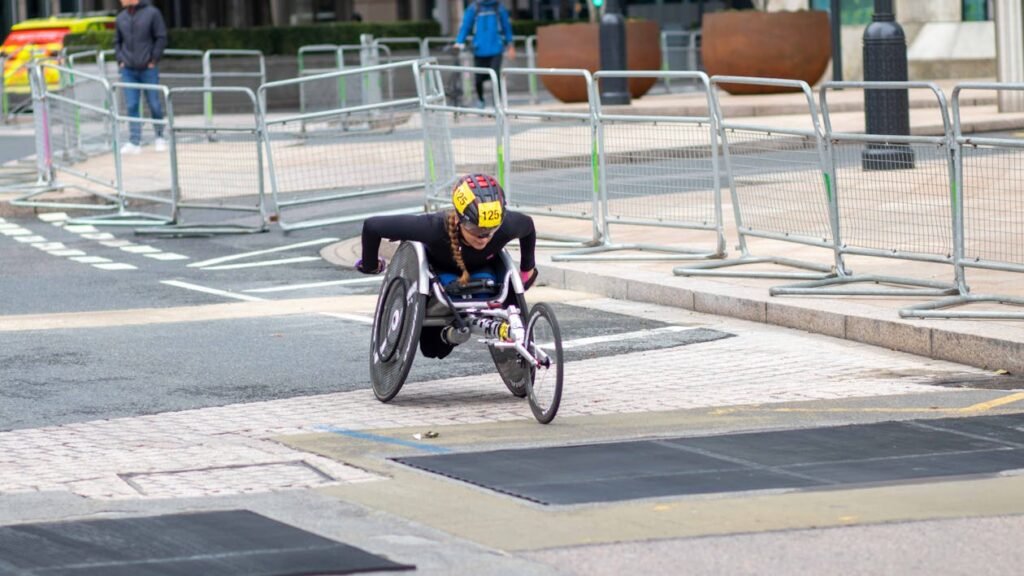Sports push the limits of human strength, resilience, and determination. But for athletes with prosthetic limbs, the journey is about more than just competition—it’s about overcoming obstacles, defying expectations, and proving that physical limitations do not define potential. Around the world, amputee athletes are breaking records, setting new standards, and inspiring millions with their incredible achievements.
From runners and swimmers to cyclists and weightlifters, these athletes demonstrate that prosthetics are not a barrier to success. Advances in prosthetic technology have transformed how they train, compete, and perform at the highest levels. The right prosthetic limb—one designed for speed, agility, and endurance—can help athletes move naturally and powerfully, allowing them to reach their full potential.
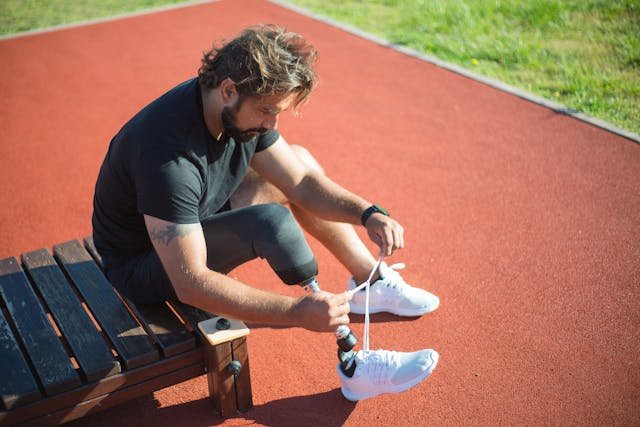
Defying Limits: How Athletes with Prosthetic Limbs Are Redefining Sports
Athletes with prosthetic limbs are proving that disability does not mean inability. Through sheer dedication, innovative prosthetic technology, and unwavering spirit, they have shattered barriers in sports that were once thought impossible for amputees.
These athletes are not just competing; they are winning medals, breaking records, and inspiring new generations to chase their dreams.
The Role of Prosthetic Technology in Athletic Performance
Advancements in prosthetic technology have played a massive role in leveling the playing field for amputee athletes.
High-performance running blades, lightweight yet powerful prosthetic arms, and custom-designed adaptive gear allow athletes to move with precision, speed, and control.
Unlike traditional prosthetics, sports prosthetics are engineered for specific activities, ensuring better balance, flexibility, and endurance.
For example, sprinters use carbon-fiber running blades that mimic the energy return of a natural foot, allowing for explosive speed. Cyclists have custom-fitted prosthetic limbs that enhance grip and aerodynamics, giving them better control over their bikes.
Weightlifters benefit from prosthetic arms that provide an enhanced range of motion while maintaining grip strength. Each advancement in prosthetic technology brings athletes one step closer to competing on equal footing with their able-bodied counterparts.
Runners Who Prove That Speed Has No Limits
One of the most well-known stories of athletic resilience comes from the world of sprinting. Competitive amputee runners have demonstrated that with the right training and prosthetic technology, they can match or even surpass able-bodied athletes.
The Paralympics has showcased some of the fastest amputee sprinters in the world, proving that physical limitations are only mental barriers waiting to be broken.
Many of these runners faced skepticism when they first stepped onto the track. Some were even told they would never run again. But with determination and the right prosthetic limbs, they transformed doubt into victory.
They have since become global icons, inspiring countless people with and without disabilities to pursue their athletic goals fearlessly.
Swimming Beyond Boundaries
Water sports require precise control, strength, and endurance, making them challenging for amputees. However, elite swimmers with prosthetic limbs have mastered the art of adapting to water dynamics, proving that missing a limb does not mean missing out on victory.
Swimmers with arm amputations use powerful leg kicks to propel themselves forward, while those with lower-limb amputations rely on upper-body strength to glide through the water with remarkable speed.
These athletes undergo intense training to perfect their strokes and breathing techniques, ensuring they maintain momentum despite their physical differences.
The ability to adapt, strategize, and push beyond limits allows them to compete at international levels, breaking records and setting new standards in adaptive sports.
Cyclists Who Conquer the Road
Cycling is another sport where amputees have made an incredible impact. With prosthetic legs designed for endurance and stability, these athletes navigate long distances, steep inclines, and high-speed turns with remarkable control.
Some cyclists use a single prosthetic leg, while others have dual prosthetic limbs engineered to maximize power output.
The technology behind these prosthetics has revolutionized the sport, providing amputee cyclists with enhanced grip, shock absorption, and better aerodynamics.
Competitive cycling requires not just physical strength but also mental endurance—qualities that these athletes possess in abundance. Through dedication and cutting-edge prosthetic design, they continue to break records and redefine possibilities.
Strength and Power: Weightlifters Who Refuse to Be Limited
Weightlifting is a sport that demands raw power, balance, and precision. For amputees, lifting heavy weights while maintaining proper form can be a challenge, but it’s a challenge they willingly embrace.
Adaptive weightlifters use prosthetic limbs that provide extra stability and grip, allowing them to execute complex movements with ease.
These athletes train rigorously to master techniques that work with their prosthetic limbs rather than against them.
With each successful lift, they send a powerful message: strength is not determined by physical completeness but by an individual’s ability to push past limitations. Their success is proof that prosthetics are not a disadvantage—they are tools that enhance human potential.
Athletes with prosthetic limbs are not just participating in sports; they are changing the way the world views disability. With determination, the right prosthetic technology, and a relentless spirit, they continue to inspire millions.
Their journeys remind us that limitations exist only in the mind, and with the right support, anything is possible.
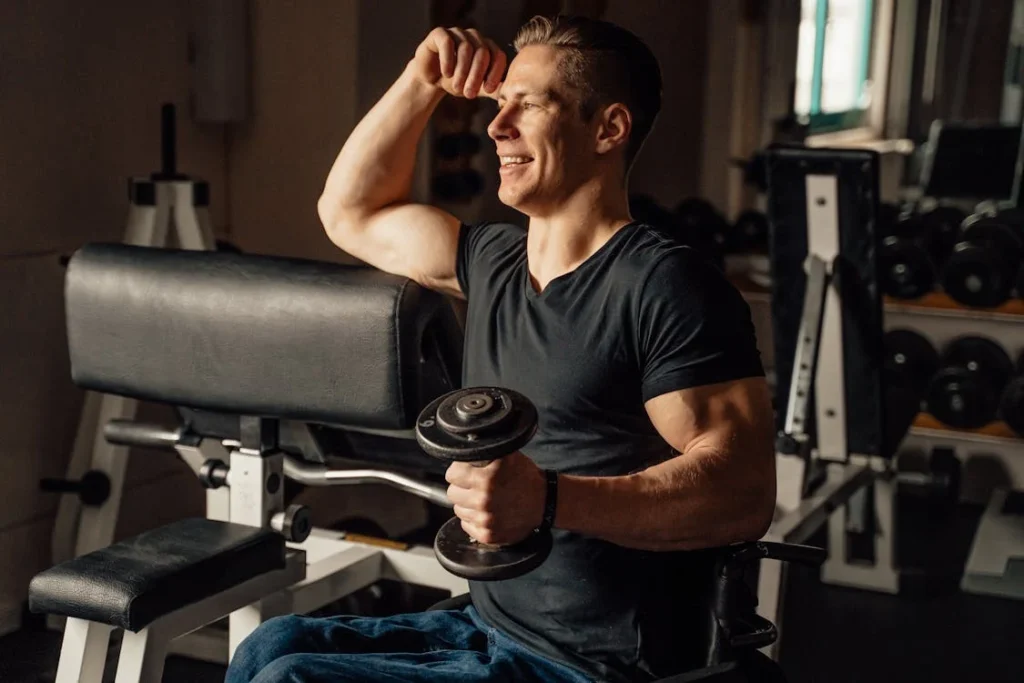
The Journey of Resilience: Athletes Who Overcame Adversity
Behind every great athlete with a prosthetic limb is a story of resilience, struggle, and an unbreakable will to succeed. Many of them have faced challenges that extend beyond the physical—self-doubt, societal stigma, financial difficulties, and emotional battles.
But despite these obstacles, they have found a way to push forward, proving that perseverance can lead to greatness.
From Tragedy to Triumph: The Power of Mindset
For many amputee athletes, the journey to success began with a life-altering event. Some lost limbs due to accidents, while others battled illnesses that forced them to adapt to a new way of living.
The moment of limb loss is often accompanied by a deep sense of grief and uncertainty. Questions like “Will I ever walk again?” or “Can I still play sports?” become overwhelming.
But what separates these athletes from the rest is their refusal to give up. Instead of letting their circumstances define them, they embraced the challenge of rebuilding their strength.
Rehabilitation became their training ground, and prosthetic limbs became their tools for success. With every step, push, or lift, they proved that the human spirit is stronger than any physical limitation.
Training Like Champions: The Dedication Behind the Success
Achieving greatness in sports requires intense training, and for amputee athletes, it means adapting workouts to fit their unique needs. Whether they are runners, swimmers, or weightlifters, they follow demanding schedules to build endurance, strength, and technique.
Training with a prosthetic limb requires an understanding of how the body moves differently. Athletes spend hours refining their balance, coordination, and agility.
They work with specialized coaches, physiotherapists, and prosthetists to ensure their prosthetic limbs function as seamlessly as possible.
The process is not easy—prosthetics can cause discomfort, and relearning movements takes time. But through persistence, they develop a deep connection with their prosthetic limbs, treating them as an extension of their own bodies.
Breaking Barriers in Competitive Sports
For a long time, amputee athletes were not given the same recognition as able-bodied competitors. Some were even denied opportunities to participate in mainstream sporting events.
However, their performances could not be ignored for long. As more amputee athletes began breaking records and proving their capabilities, sports organizations started creating platforms for them to compete at the highest levels.
The Paralympic Games became a global stage for these athletes, allowing them to showcase their skills and inspire the world.
But many of them did not stop there—they fought to compete alongside able-bodied athletes, proving that their prosthetic limbs were not an unfair advantage, but a means to level the playing field.
Today, amputee athletes are paving the way for a more inclusive sports industry. They are pushing for equal recognition, improved prosthetic technology, and greater accessibility to adaptive sports. Their victories are not just personal achievements—they are milestones that open doors for future generations.
The Emotional and Psychological Strength Behind Their Success
Beyond the physical challenges, athletes with prosthetic limbs must also develop immense emotional strength. Competing at an elite level comes with pressure, and doubts can creep in.
There are moments of frustration when training feels exhausting, when prosthetic limbs need adjustments, or when injuries slow progress.
But these athletes have learned to channel their struggles into motivation. Their mindset is built on resilience, and they use every setback as fuel to push harder.
Many of them also become advocates, using their stories to inspire others facing similar challenges. They prove that confidence, self-belief, and perseverance are just as important as physical strength.
At Robobionics, we recognize the incredible determination of these athletes and the role of prosthetic innovation in their success. Their stories remind us that with the right tools, mindset, and support, anything is possible.
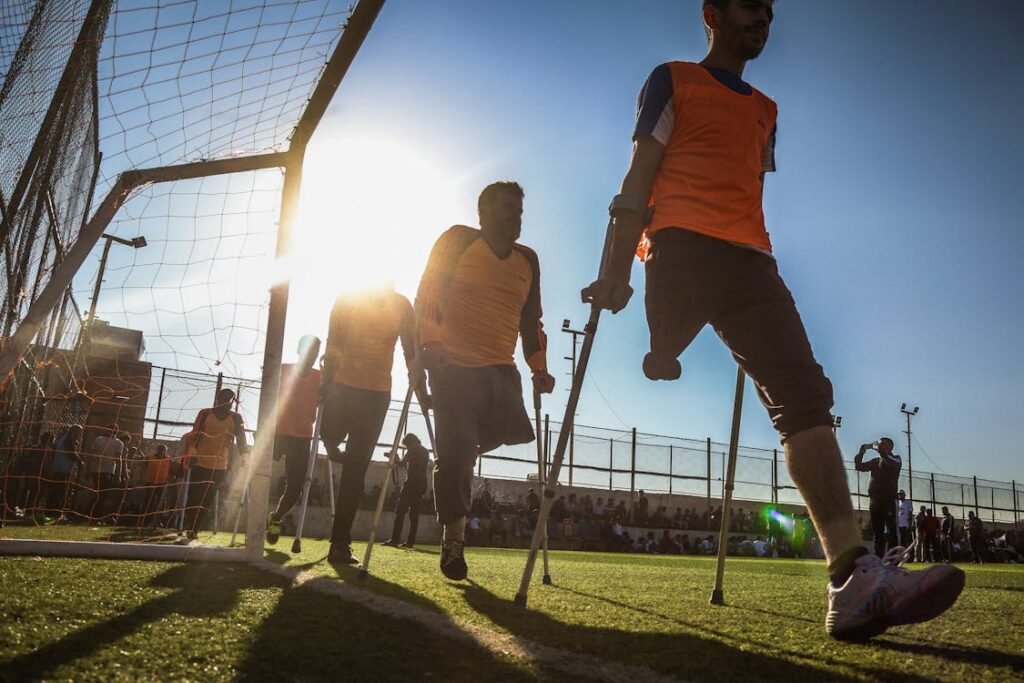
Changing Lives: The Impact of Adaptive Sports on Amputees
Sports are more than just competition—they are a powerful tool for personal transformation. For amputees, participating in adaptive sports goes beyond physical fitness; it fosters self-confidence, mental resilience, and a sense of belonging.
Whether competing professionally or engaging in recreational activities, the impact of sports on amputees is life-changing.
Rebuilding Confidence Through Movement
One of the biggest struggles for many amputees after losing a limb is regaining confidence in their own body. Simple movements that once felt natural can feel foreign and challenging.
Walking, running, or even maintaining balance may require practice and patience. Sports provide a structured way to relearn these movements while building strength and endurance.
When an amputee trains, every small achievement—whether it’s running an extra mile, lifting more weight, or swimming faster—becomes a milestone.
Each victory, no matter how small, reinforces the belief that they are capable, strong, and in control of their own body. This shift in mindset helps amputees feel empowered in all areas of life, from daily tasks to career aspirations.
The Role of Community and Support Networks
Adaptive sports create a sense of community, allowing amputees to connect with others who share similar experiences. Being surrounded by teammates and coaches who understand the journey helps reduce feelings of isolation and encourages self-growth.
Many athletes find their strongest support systems in the sports world, forming friendships that go beyond the competition.
For some, sports become a platform for advocacy. Many amputee athletes use their experiences to inspire and mentor others, proving that limb loss does not mean giving up on dreams.
These communities provide guidance, motivation, and encouragement, making it easier for newcomers to step into the world of adaptive sports with confidence.
Physical and Mental Health Benefits
Regular physical activity is crucial for maintaining a healthy lifestyle, and this is especially true for amputees.
Sports improve cardiovascular health, enhance muscle strength, and promote better mobility, helping amputees live more active and independent lives. Strength training, flexibility exercises, and endurance workouts all contribute to overall well-being.
Beyond physical health, sports have a profound impact on mental well-being. Exercise is a natural stress reliever, releasing endorphins that improve mood and reduce anxiety.
Many amputees who engage in sports report lower levels of depression and greater self-esteem. Sports provide a positive outlet for energy, focus, and determination, replacing frustration with a sense of purpose.
Breaking Barriers Beyond Sports
The confidence and discipline that amputees gain through sports often extend into other areas of their lives. Many athletes go on to pursue careers in coaching, public speaking, entrepreneurship, and activism.
Their achievements in sports give them the courage to take on challenges outside the athletic world, proving that determination can lead to success in any field.
Additionally, the visibility of successful amputee athletes has changed societal perceptions of disability. No longer seen as a limitation, prosthetics are now recognized as tools of empowerment.
As these athletes continue to break barriers, they pave the way for greater inclusion in workplaces, education, and public spaces.
The Role of Technology in Shaping the Future of Adaptive Sports
The evolution of prosthetic technology continues to push the boundaries of what amputee athletes can achieve. With the development of lighter, stronger, and more adaptive prosthetic limbs, the possibilities in sports are expanding.
From AI-assisted prosthetics that adjust in real-time to customized 3D-printed limbs designed for specific sports, innovation is transforming the way amputees train and compete.
At Robobionics, we believe in the power of these advancements to change lives. Our mission is to provide amputees with high-quality, functional prosthetics that allow them to move freely and confidently.
We celebrate every athlete who proves that nothing is impossible, and we remain committed to supporting those who dare to dream big.
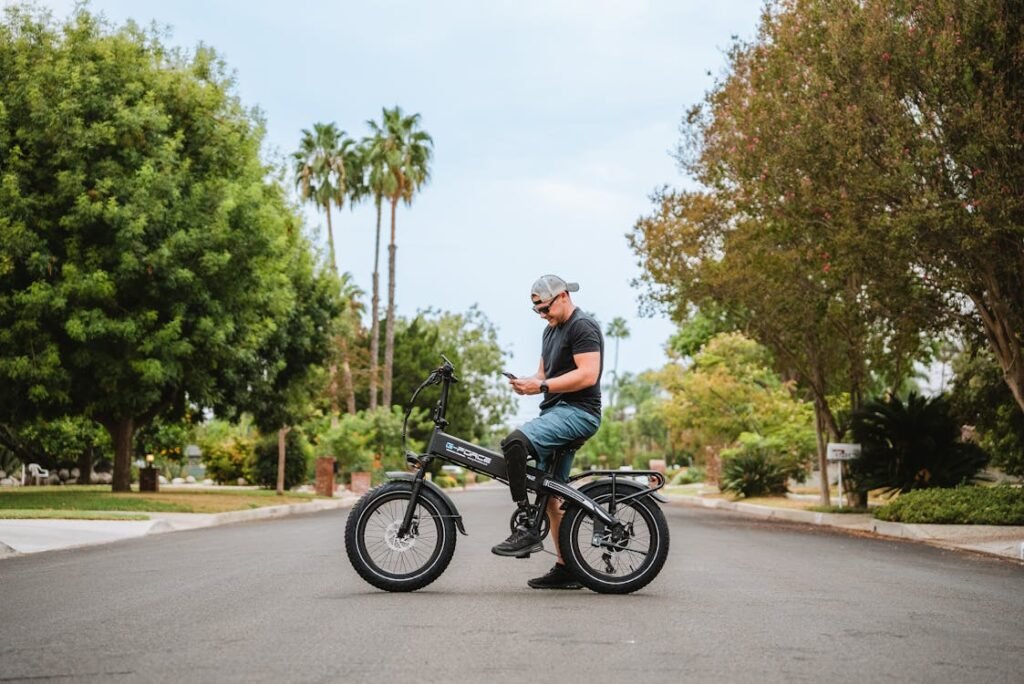
The Science Behind Prosthetic Performance in Sports
Athletes with prosthetic limbs don’t just rely on determination and training—they also depend on cutting-edge science to optimize their performance. Prosthetic limbs designed for sports must meet incredibly high standards of durability, flexibility, and responsiveness.
Every material, joint, and connection is carefully engineered to mimic natural movement while maximizing efficiency.
The intersection of biomechanics, material science, and artificial intelligence has created a new era in adaptive sports, allowing amputees to perform at elite levels.
How Biomechanics Shapes Prosthetic Design
Biomechanics is the study of movement, and for amputee athletes, it plays a crucial role in designing prosthetic limbs that function as seamlessly as natural ones.
Engineers and prosthetists analyze an athlete’s posture, gait, and muscle engagement to create custom prosthetics that optimize energy return and minimize strain.
For example, in sprinting, natural legs store and release energy as the foot strikes the ground and pushes off. Carbon-fiber running blades replicate this process by absorbing kinetic energy upon impact and releasing it during propulsion.
This allows amputee sprinters to move efficiently without unnecessary energy loss.
Cyclists using prosthetic legs require precise alignment to ensure their strokes are powerful and smooth. A misaligned prosthetic limb can create imbalances that lead to inefficiency or discomfort.
Engineers fine-tune the angles and pivot points of cycling prosthetics to ensure the rider achieves maximum power output with minimal fatigue.
Material Science: Creating Stronger, Lighter, and More Responsive Prosthetics
The materials used in sports prosthetics must be lightweight yet incredibly strong. Traditional prosthetic limbs were made of metal, but advancements in carbon fiber, titanium, and high-performance polymers have revolutionized prosthetic design.
Carbon fiber, in particular, is preferred for athletic prosthetics due to its ability to store energy and withstand extreme forces without adding extra weight.
Swimming prosthetics use water-resistant materials that do not absorb moisture, ensuring that the athlete remains streamlined in the water.
These prosthetics are designed to provide minimal drag while maximizing propulsion, allowing swimmers to maintain speed without resistance.
For upper-limb amputees, prosthetic arms used in weightlifting, rowing, or gymnastics require a careful balance of strength and flexibility.
Advanced grip-enhancing materials ensure that athletes maintain control of equipment, even under heavy loads. With stronger, more responsive materials, prosthetic limbs can handle the demands of high-intensity sports without compromising durability.
AI and Smart Prosthetics: The Future of Adaptive Sports
Artificial intelligence is beginning to play a role in adaptive sports by making prosthetic limbs more intuitive and responsive. AI-powered prosthetics can analyze an athlete’s movement in real time and adjust accordingly.
For example, an AI-assisted running blade can detect changes in terrain and automatically modify stiffness to ensure better stability and efficiency.
In weightlifting, smart prosthetic arms with muscle sensors can detect grip strength and adjust tension to provide a more natural lifting experience.
Cyclists can benefit from AI-controlled microprocessors in their prosthetic legs, which adapt pedaling resistance to maintain a steady rhythm. These innovations allow amputee athletes to fine-tune their performance at a level that was once impossible.
Pushing the Limits of Human Potential
As prosthetic technology advances, the debate around whether it gives amputee athletes an unfair advantage continues. Some argue that engineered limbs could outperform biological ones, leading to restrictions in competitive sports.
However, research shows that while prosthetics can enhance efficiency, they do not provide an automatic advantage. The reality is that athletes with prosthetic limbs must train harder to compensate for lost muscle control and balance.
At Robobionics, we see prosthetic limbs not as an unfair advantage, but as tools that level the playing field. Every athlete deserves the opportunity to compete at their highest potential, and technology should be embraced as a way to enhance accessibility, not restrict it.
The fusion of science and sports is opening new doors for amputees, proving that with the right innovations, human potential has no limits.
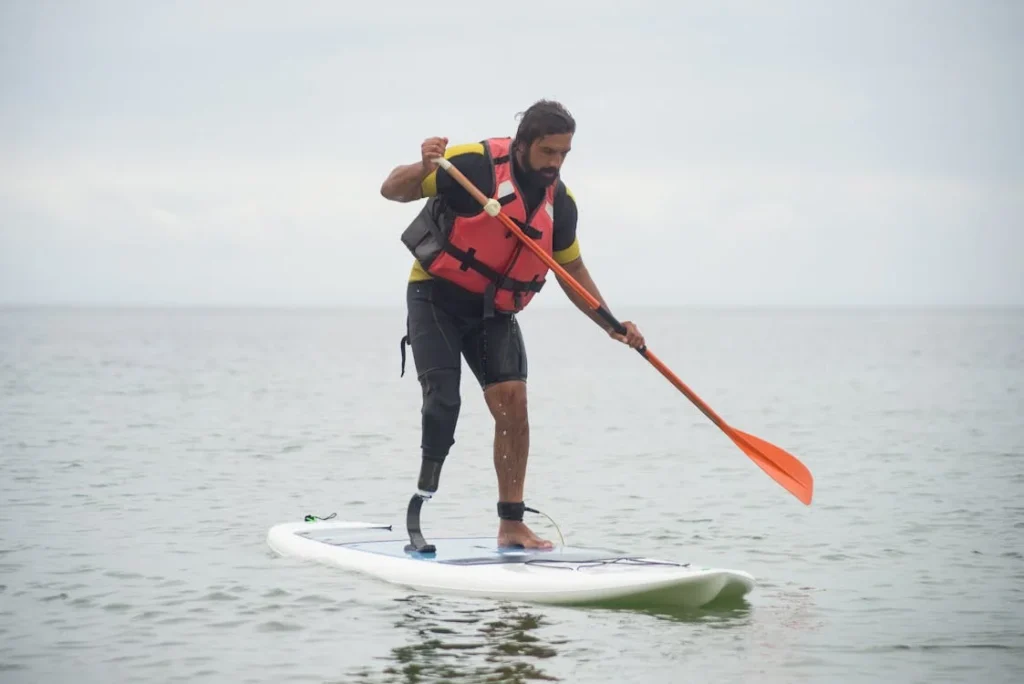
The Psychological Edge: The Mental Strength of Amputee Athletes
Success in sports isn’t just about physical ability—it’s also about mental toughness. For amputee athletes, the psychological challenges can often be as demanding as the physical ones.
Competing with a prosthetic limb requires resilience, focus, and the ability to overcome self-doubt. The strongest athletes are not just those with the best training but those who have mastered their mindset.
Overcoming Fear and Self-Doubt
For many amputees, the biggest hurdle is not the competition itself but the fear of not being “good enough.” Losing a limb can be a life-altering experience, leading to doubts about what is still possible.
Stepping onto the track, into the pool, or onto the field for the first time can be intimidating.
Athletes who succeed at the highest levels learn to reframe these fears. Instead of focusing on limitations, they concentrate on what they can achieve.
They push through the discomfort, the uncertainty, and the fear of judgment. Every small victory—whether it’s completing a workout, mastering a technique, or improving reaction time—reinforces their confidence and proves that they are capable.
Building Mental Resilience
Competing with a prosthetic limb requires adapting to new ways of moving, which can be frustrating at times. Many amputee athletes experience setbacks, whether it’s discomfort from a new prosthetic, difficulty balancing, or struggling to regain endurance.
The ability to stay motivated despite these obstacles is what separates elite athletes from the rest.
Resilience comes from pushing through difficult training sessions, maintaining a positive mindset after losses, and understanding that progress is never linear.
Many top amputee athletes credit their success to mental training just as much as physical conditioning. They visualize success, use positive affirmations, and stay focused on long-term goals rather than momentary struggles.
The Power of Visualization and Mindset Training
Mental preparation is just as important as physical training. Many amputee athletes use visualization techniques to mentally rehearse their performance before competing.
By picturing themselves crossing the finish line, executing a perfect jump, or hitting a new personal best, they train their minds to believe in success.
Mindset training also involves handling pressure and nerves. Competing at an elite level means dealing with expectations—both internal and external. Many athletes work with sports psychologists to develop routines that keep them calm, focused, and confident during competition.
Handling Public Perception and Breaking Stereotypes
Athletes with prosthetic limbs often find themselves in the spotlight—not just for their achievements but for the way society perceives them.
Some see them as “inspirations,” while others question whether prosthetics provide an unfair advantage. Dealing with these perceptions can be mentally exhausting.
Many amputee athletes push back against labels of pity or limitation. They want to be recognized for their skill, training, and determination, not just their disability.
By competing at the highest levels, they shift the narrative from “overcoming disability” to “excelling in sports.” Their success changes public perceptions, proving that ability matters more than physical differences.
Support Systems and the Role of Community
Mental strength is not built alone. Behind every successful amputee athlete is a strong support system—coaches, teammates, family, and fans who believe in them. Surrounding themselves with people who encourage their growth makes a huge difference in staying motivated.
Many athletes also find strength in mentoring others. By sharing their experiences, they help other amputees see what’s possible. Knowing that their journey can inspire someone else to take up sports, push past fear, or embrace their prosthetic limb fuels their own determination.
At Robobionics, we understand that true strength comes from within. The athletes who redefine limits are not just physically strong but mentally unstoppable. Their stories remind us that success is about mindset, perseverance, and believing in the impossible.
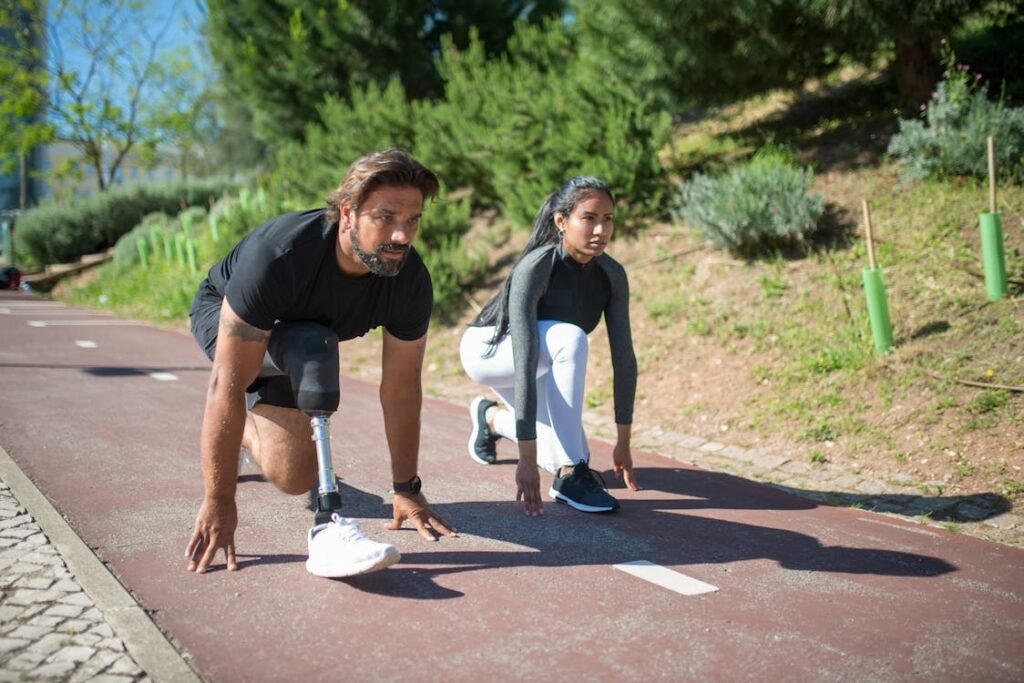
Breaking Records and Changing History: Amputee Athletes Who Made an Impact
Some athletes don’t just compete—they leave a lasting mark on history. Amputee athletes have risen to the highest levels of competition, proving that their abilities are just as impressive as any able-bodied competitor.
Their victories have reshaped the sports world, challenging outdated perceptions and inspiring millions.
The Paralympics: A Global Stage for Excellence
The Paralympic Games have provided amputee athletes with a platform to showcase their talent and determination. Since their inception, these games have grown into a global movement, proving that sports are about ability, not disability.
Athletes in sprinting, swimming, cycling, and weightlifting have broken records that once seemed impossible, proving that prosthetics are not a limitation but a tool for excellence.
Paralympians train with the same intensity as Olympic athletes, pushing their bodies and minds to the limit. Their performances have shattered stereotypes and shown that adaptive sports deserve the same recognition as any other competition.
The gap between the Paralympics and mainstream sporting events is closing, thanks to the dedication of these groundbreaking athletes.
Amputee Runners Who Changed the Game
Sprinting is one of the most electrifying sports, and amputee athletes have taken it to the next level. Some of the fastest runners in the world use carbon-fiber running blades, allowing them to achieve incredible speeds.
These athletes have not only set records in Paralympic events but have also sparked discussions about competing alongside able-bodied runners.
The debate over whether running blades provide an advantage has been ongoing, but one thing remains clear—these athletes train relentlessly to reach their peak.
Their achievements continue to push sports science forward, leading to better prosthetic designs and greater opportunities for future competitors.
From War Zones to the Winner’s Circle
Many amputee athletes come from backgrounds of extreme adversity. Some lost limbs due to war, accidents, or medical conditions, but instead of letting their circumstances define them, they used sports to rebuild their lives.
Former soldiers, for example, have turned to adaptive sports as a way to regain strength and purpose after injury.
The Invictus Games, founded for wounded and injured service members, have given military veterans a space to compete and heal through sports. Many of these athletes go on to compete in the Paralympics, proving that recovery is not just about survival—it’s about thriving.
Athletes Who Paved the Way for Future Generations
Before today’s advanced prosthetic technology, earlier generations of amputee athletes had to work with limited options. Despite facing greater physical challenges, they still set records, inspired change, and pushed for better accessibility in sports.
Their efforts laid the foundation for today’s athletes, ensuring that future generations have access to better prosthetics, training, and opportunities.
Their influence extends beyond sports. Many former athletes have become advocates, pushing for policy changes that improve access to adaptive equipment and competitions.
Their work ensures that young amputees have the resources they need to pursue their dreams without facing unnecessary barriers.
What the Future Holds for Amputee Athletes
The next generation of amputee athletes is stepping onto the global stage with even greater ambition. As technology continues to improve, the boundaries of human performance will be pushed even further.
More amputees are joining mainstream sports, challenging the idea that disability should define athletic potential.
At Robobionics, we believe that the future of sports is inclusive. With advancements in prosthetic design, better training programs, and growing awareness, amputee athletes will continue to break records, change perceptions, and inspire the world.
Their stories remind us that limits exist only in the mind—and that with determination and the right tools, anything is possible.
Conclusion
The world of sports is not defined by physical ability alone—it is shaped by determination, resilience, and the will to succeed. Amputee athletes have shown time and again that losing a limb does not mean losing the ability to compete, achieve, and inspire. With advancements in prosthetic technology, rigorous training, and an unbreakable mindset, they continue to break records, challenge stereotypes, and redefine what is possible.
These athletes do more than just win medals; they transform the way society views disability. Their journeys remind us that perseverance can overcome any obstacle, and that the human spirit is stronger than any limitation. Whether on the track, in the pool, or on the field, they prove that sports are about ability, not disability.
At Robobionics, we are proud to support the next generation of amputee athletes with cutting-edge prosthetic solutions designed for strength, agility, and endurance. If you or a loved one is looking for a high-performance prosthetic limb, book a free demo of Grippy™ today and take the first step toward an active future!



